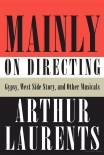Mainly on Directing, Arthur Laurents [best books for students to read TXT] 📗

- Author: Arthur Laurents
Book online «Mainly on Directing, Arthur Laurents [best books for students to read TXT] 📗». Author Arthur Laurents
Nothing revealed more how Tom's death had changed my perspective on the theatre and on what mattered in life than my reaction to the fevered speculation over Broadway for Gypsy. I didn't care about going to Broadway. I had done what Tom wanted me to do, and I had accomplished what I wanted to accomplish. Well, not entirely: Patti still hadn't fully realized her potential, although you'd never have known it from the hysteria she caused in the audience. Gypsy as a show, however, had been the event I promised it would be—bigger, actually, than anyone's dream. I was proud how well my work was received; that was enough for me. I didn't need money or Broadway's validation.
And there had been a lovely bonus: my relationship with Patti. A piece of paper couldn't come between us. She was on the road, doing concerts on what she called her Pay-Off-the-Debts Tour. We e-mailed constantly, her notes always asking, “Any news about us on Broadway?” The designers called now and then. They had counted on London to finally bring some money for their work. That work had been even harder than it would have been in a Broadway production, because they had to spend so much time and call in so many chips to make magical bricks out of discount straw. They didn't ask about Broadway, but I knew. To the actors who had never been on Broadway, some of them never even been in a show, Broadway was an impossible dream, but they dreamed it anyway and I knew. The actors who were not neophytes but had never had parts this good and had never been as good—I knew. But when Patti had to face that not only were dreams of going to Broadway gone but hope was gone, Gypsy was not going to Broadway or anywhere else, she was devastated, and I didn't want to know that. Patti LuPone is a raw life force; she must not be devastated. But she was. It was awful to behold, and I couldn't. So I went to work to get Gypsy on Broadway, even though I thought of Broadway as Chernobyl.
Among the small group of producers who had contributed enhancement money for the show at City Center and who were supposed to do it in London, there was one who was quietly passionate about theatre—what he himself thought was theatre, not necessarily what he was told was theatre. No nuance of this production of Gypsy escaped him; he loved it unequivocally. He was also the most likely to take a risk for what he believed in, the most likely to have the lottery number that could get Gypsy to Broadway. Uniquely, he was a producer you could trust. As anyone active in the theatre reading this already knows, his name is Roger Berlind. Roger is responsible for Gypsy playing on Broadway. I promised him and all the producers that I would make the New York Times change its mind about Patti LuPone. It's what critics praise, not what they pan, that antagonizes and depresses the theatre community. Even Hamlet has flaws. I wasn't just pitching the producers when I said I could make the Times change its mind; I believed it, and I believed I could because I agreed with the objections.
If I had admitted that to anyone, I would have been stoned; but to know what is wrong, even just to think you know, makes it easier to get it right.
The hardest thing to get in New York is a theatre for a musical. We had the St. James, where I had done Gypsy with Tyne Daly in 1989—a good omen. But during the time it took to get the financing, we lost the St. James. The breath-holding period during which a London transfer seemed set to supplant us took its toll on Patti. When the St. James was once again ours, solidly this time, her relief was too enormous. Patti LuPone, Star, made her appearance with a litany of complaints and demands. I didn't want to face rehearsals for a Chernobyl venue with a diva, however talented. I invited her to dinner.
“What's wrong?” she asked, her antennae out. Oh, she knew me and she knew herself.
Part of being a director is being a therapist. Patti's diva behavior stemmed from student days at Juilliard, when she felt her talent wasn't given the full recognition it deserved because she didn't look like the conventional idea of a leading lady. Even a nontherapist would know it dated farther back than that, but Juilliard is as far back as I'm going.
Dinner was at a table in the window of Chez Josephine on Forty-second Street's Theatre Row, rain really slamming down outside. A long hug—we were genuinely glad to be together again—hello-hello with the owner from both of us, drinks ordered and served, and then a conversation that was largely a monologue from me:
Her complaints and demands were her prerogative as





Comments (0)